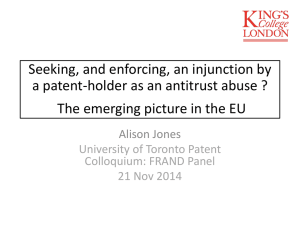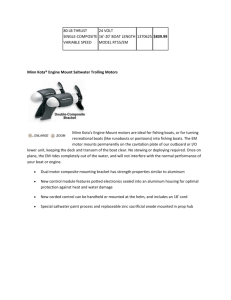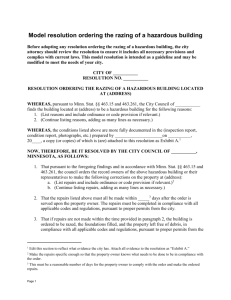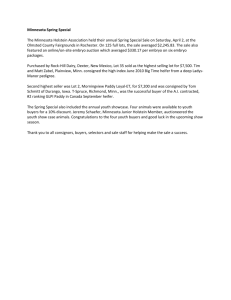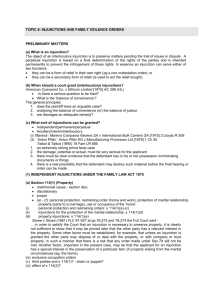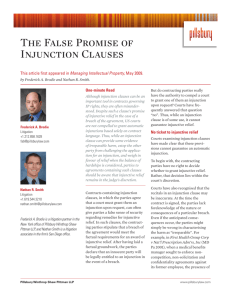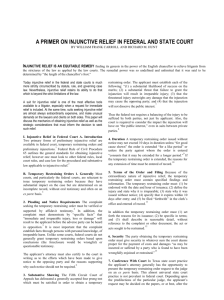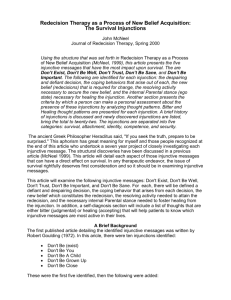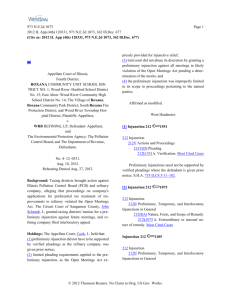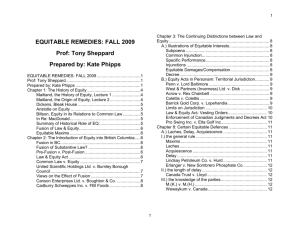downloads/JUDICIAL TRAINING UPDATE 11
advertisement
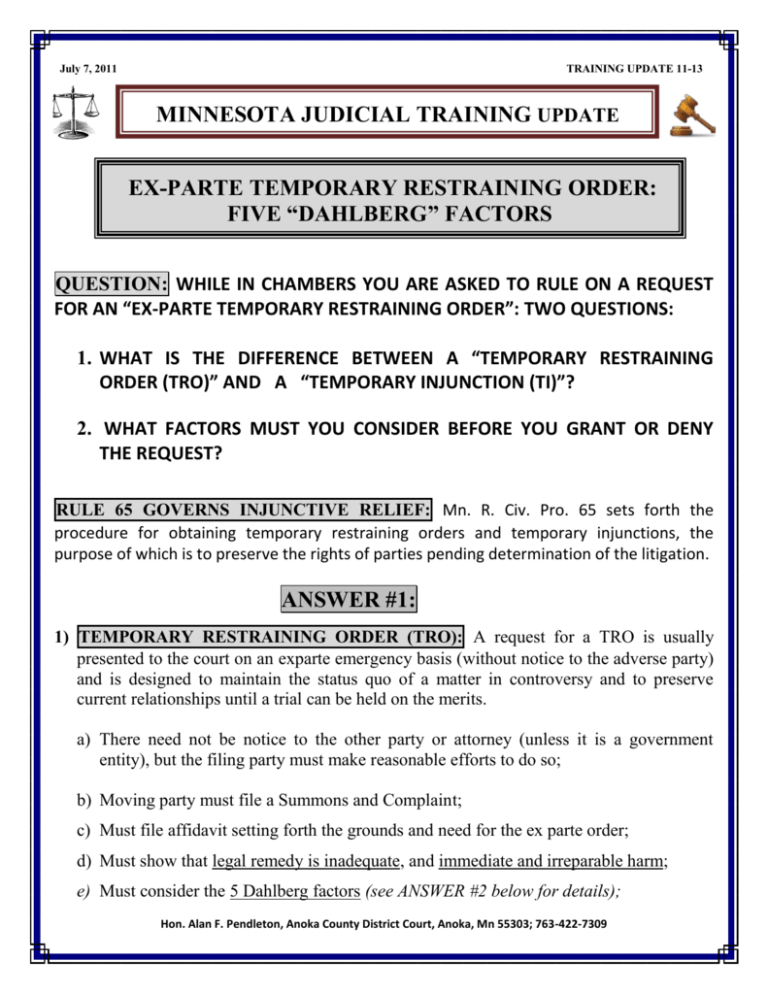
July 7, 2011 TRAINING UPDATE 11-13 MINNESOTA JUDICIAL TRAINING UPDATE EX-PARTE TEMPORARY RESTRAINING ORDER: FIVE “DAHLBERG” FACTORS QUESTION: WHILE IN CHAMBERS YOU ARE ASKED TO RULE ON A REQUEST FOR AN “EX-PARTE TEMPORARY RESTRAINING ORDER”: TWO QUESTIONS: 1. WHAT IS THE DIFFERENCE BETWEEN A “TEMPORARY RESTRAINING ORDER (TRO)” AND A “TEMPORARY INJUNCTION (TI)”? 2. WHAT FACTORS MUST YOU CONSIDER BEFORE YOU GRANT OR DENY THE REQUEST? RULE 65 GOVERNS INJUNCTIVE RELIEF: Mn. R. Civ. Pro. 65 sets forth the procedure for obtaining temporary restraining orders and temporary injunctions, the purpose of which is to preserve the rights of parties pending determination of the litigation. ANSWER #1: 1) TEMPORARY RESTRAINING ORDER (TRO): A request for a TRO is usually presented to the court on an exparte emergency basis (without notice to the adverse party) and is designed to maintain the status quo of a matter in controversy and to preserve current relationships until a trial can be held on the merits. a) There need not be notice to the other party or attorney (unless it is a government entity), but the filing party must make reasonable efforts to do so; b) Moving party must file a Summons and Complaint; c) Must file affidavit setting forth the grounds and need for the ex parte order; d) Must show that legal remedy is inadequate, and immediate and irreparable harm; e) Must consider the 5 Dahlberg factors (see ANSWER #2 below for details); Hon. Alan F. Pendleton, Anoka County District Court, Anoka, Mn 55303; 763-422-7309 July 7, 2011 TRAINING UPDATE 11-13 NOTE: If TRO is granted – must set for Temporary Injunction Hearing as soon as possible. 2) TEMPORARY INJUNCTION (TI): The “Motion for Temporary Injunction” with notice, shall be set down for hearing at the earliest practicable time and shall take precedence over all other matters. The purpose for a Temporary Injunction is the same for a TRO, namely to maintain the status quo of a matter in controversy and to preserve current relationships until a trial can be held on the merits. a) The district court may grant a temporary injunction if affidavits, deposition testimony, or oral testimony demonstrate sufficient grounds. Minn.R.Civ.P. 65.02(b). b) In Minnesota, injunctive relief is appropriate if the moving party can show: i) A party will suffer irreparable injury before a trial on the merits; and ii) The relief sought in the action will be ineffectual or impossible to grant unless the status quo is maintained (i.e. inadequate legal remedy). c) Must consider the 5 Dahlberg factors (see ANSWER #2 below for details); ANSWER #2: FIVE DAHLBERG FACTORS: There are five factors a court needs to consider in determining the propriety of granting a TRO or Temporary Injunction, See Dahlberg Brothers, Inc. v. Ford Motor Co., 137 N.W.2d 314, 321-322 (1965); Eakman v. Brutger, 285 N.W.2d 95 (Minn.1979). 1) THE RELATIONSHIP BETWEEN THE PARTIES: If the relationship has no bearing on the Court’s determination of whether to grant a temporary injunction, this factor would be considered neutral in the Court’s analysis. However, there can be situations when this factor becomes relevant: For example, if the relationship is a long-standing business relationship where the parties have certain expectations and inter-dependencies; or the relationship is a dominant-subservient one; or, if the parties are direct competitors. Hon. Alan F. Pendleton, Anoka County District Court, Anoka, Mn 55303; 763-422-7309 July 7, 2011 TRAINING UPDATE 11-13 2) THE HARM TO BE SUFFERED BY THE MOVING PARTY IF THE TEMPORARY INJUNCTIVE RELIEF IS DENIED AS COMPARED TO THAT INFLICTED ON THE NON-MOVING PARTY IF THE RESTRAINING ORDER ISSUES: The comparative harm to the parties: While all five Dahlberg factors must be considered, even if the party seeking the injunction reaches its burden in regard to some factors, an injunction will only be awarded when it is clear that an injunction will prevent a great and irreparable injury. Failure to show irreparable harm is generally sufficient grounds to deny a temporary injunction. FOR EXAMPLE: The Court of Appeals has stated, a) Irreparable injury can be inferred from the breach of a restrictive covenant if the former employee came into contact with the employer’s customers in a way which obtains a personal hold on the good will of the business. Medtronic, Inc. v. Advanced Bionics, 630 N.W.2d 438, 451 (Minn. Ct. App. 2001); b) However, a temporary injunction cannot be issued if there is an adequate legal remedy. Pacific Equipment & Irrigation, Inc. v. Toro Co., 519 N.W.2d 911, 914 (Minn. Ct. App. 1994). The possibility that adequate compensatory or other corrective relief will be available at a later date, in the ordinary course of litigation, weighs heavily against a claim of irreparable harm. Miller v. Foley, 317 N.W.2d at 713; When an injury alleged is primarily economic, grounds for temporary injunction are not established. Morse v. City of Waterville, 458 N.W.2d 728 (Minn. Ct. App. 1990). 3) THE LIKELIHOOD OF SUCCESS ON THE MERITS: If a plaintiff can show no likelihood of prevailing on the merits, the court cannot grant a temporary injunction. Metropolitan Sports Facilities Comm’n v. Minnesota Twins Partnership, 638 N.W.2d 214, 226 (Minn. Ct. App. 2002). However, if a plaintiff makes even a doubtful showing as to the likelihood of prevailing on the merits, a court may issue a temporary injunction to preserve the status quo until trial. Id. 4) THE PUBLIC INTEREST & CONSIDERATION OF PUBLIC POLICY: Many TRO’s involve contractual disputes. Public policy does not favor restraints in trade. However, it does favor the ability of a business to retain the goodwill of its clients. In addition, it favors the enforcement of proper contracts. Hon. Alan F. Pendleton, Anoka County District Court, Anoka, Mn 55303; 763-422-7309 July 7, 2011 TRAINING UPDATE 11-13 5) ADMINISTRATIVE BURDEN OF SUPERVISING & ENFORCING ORDER: Plaintiffs often argue there would be no administrative burden associated with overseeing the temporary injunction because if Defendant does not comply, Plaintiff will commence contempt proceedings. Courts usually note that contempt proceedings do, in fact, cause a burden to the Court, though no greater burden than enforcement of any court order. If the Court finds that the administrative burdens associated with overseeing the order are negligible, this factor would be neutral in the Court’s determination. NOTE: RISK OF APPEAL: An order granting an injunction may be overturned if the court fails to make findings of fact regarding the Dahlberg factors. Crowley Co. v. Metropolitan Airports Comm'n, 394 N.W.2d 542, 545 (Minn.App.1986) (failure to make findings constitutes error when appellate court cannot determine what trial court concluded with regard to Dahlberg factors). NOTE: POSTING A SECURITY BOND: Pursuant to Minn. R. Civ. Practice 65.03: “No temporary restraining order or temporary injunction shall be granted except upon the giving of security by the applicant, in such sum as the court deems proper, for the payment of such costs and damages as may be incurred or suffered by any party who is found to have been wrongfully enjoined or restrained.” In addition, many judges overlook Minn. Gen. R. Practice 135 which addresses minimum security requirements in restraining orders. Per that rule - Before any restraining order shall issue, except in cases exempted by law, the applicant shall give a bond in the sum of at least $2,000……… However, by statute, governmental entities are not required to post bonds for temporary restraining orders. MS 574.18 (1990). And the court may waive the bond requirement when granting an order temporarily restraining an action on a contract for the conveyance of real estate. MS 559.211 (1990). ADDITIONAL SOURCES: Hon. Patrick Robben, Hennepin County; Pickerign v. Pasco Mktg., Inc., 303 Minn. 442, 228 N.W.2d 562 (1975); Sandborn Mrg. Co. v. Currie, 500 N.W.2d 161 (Minn.App.1993); Lano Equip., Inc. v. Clark Equip. Co., 399 N.W.2d 694 (Minn.App.1987); U.S. Bank Nat’l Ass’n v. Angeion Corp., 615 N.W.2d 425, 434 (Minn.App.2000); Cherne Indus, Inc. v. Grounds & Assocs., Inc., 278 N.W.2d 81, 92 (Minn.1979); Rosewood Mortgage Corp. v. Hefty, 383 N.W.2d 456 (Minn.App.1986). Hon. Alan F. Pendleton, Anoka County District Court, Anoka, Mn 55303; 763-422-7309

